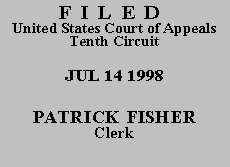

| DEWAYNE C. CAMPBELL,
Plaintiff-Appellant, v. KENNETH S. APFEL, Commissioner of Social Security Administration, Defendant-Appellee. |
|
Plaintiff-appellant Dewayne C. Campbell appeals the district court's affirmance of the decision by the Commissioner of Social Security denying plaintiff's applications for disability insurance benefits and supplemental security income. Because the Commissioner's decision is supported by substantial evidence and no legal errors occurred, we affirm.
Plaintiff applied for social security benefits in January 1993, alleging an inability to work due to heat intolerance, a skin disorder, hypertension, and mental impairments. After a hearing, an administrative law judge (ALJ) determined that although plaintiff could not perform his previous medium to heavy work, he could perform sedentary work with certain environmental restrictions, and thus was not disabled. In January 1996, the district court reversed this decision, finding the ALJ inadequately evaluated plaintiff's mental impairments and the frequency of his dermatological treatments.
Upon remand, a different ALJ determined, after a hearing, that plaintiff is not disabled because he can perform his former work as a convenience store clerk. The Appeals Council denied review, making the ALJ's decision the final decision of the Commissioner of Social Security. The district court affirmed, and this appeal followed.
We review the Commissioner's decision to determine whether his factual findings are supported by substantial evidence and whether correct legal standards were applied. See Hawkins v. Chater, 113 F.3d 1162, 1164 (10th Cir. 1997). Substantial evidence is "such relevant evidence as a reasonable mind might accept as adequate to support a conclusion." Richardson v. Perales, 402 U.S. 389, 401 (1971) (quotations omitted). We may "neither reweigh the evidence nor substitute our judgment for that of the agency." Casias v. Secretary of Health & Human Servs., 933 F.2d 799, 800 (10th Cir. 1991).
Plaintiff argues the first ALJ's finding that he was limited to sedentary employment collaterally estopped the second ALJ from finding he could perform his former work. The principles of res judicata and collateral estoppel do not apply, however, because the first judgment was not final. Instead, the first ALJ's decision was reversed on appeal, with no indication by the district court that it intended to affirm separately a finding that plaintiff is limited to sedentary work. Further, the second ALJ's decision was based on more complete evidence of plaintiff's condition, including a detailed functional evaluation by his treating physician in 1996. The cases cited by plaintiff examine a very different situation, addressing the preclusive effect of a final judgment on a subsequent application for benefits. See Dennard v. Secretary of Health & Human Servs., 907 F.2d 598, 598, 600 (6th Cir. 1990); Lively v. Secretary of Health & Human Servs., 820 F.2d 1391, 1392 (4th Cir. 1987); Gavin v. Heckler, 811 F.2d 1195, 1197, 1199-1200 (8th Cir. 1987).
Plaintiff argues the ALJ erred in failing to treat his need to wear protective clothing as a limit on his ability to work, alleging the ALJ merely considered the detrimental effect of such measures on employability as resulting from a hiring practice. This argument is not supported by the record, however.
Plaintiff's doctor reported that plaintiff should avoid exposure to sunlight for eight to twelve hours following his PUVA treatments. See Appellant's App. at 270. Although the report suggested this might by accomplished by wearing protective clothing, goggles or sunglasses, and sun screen, there is no indication that such measures were necessary inside a building such as a convenience store. Further, the ALJ's hypothetical questions to the vocational expert included a restriction on exposure to direct sunlight and eliminated the regular daytime work hours between 8:00 or 9:00 a.m. and 5:00 p.m. See id. at 335-37. The ALJ, therefore, took into account plaintiff's need to avoid sunlight as a medical requirement affecting his ability to work. Because the vocational expert testified that a significant number of jobs existed even with these restrictions, substantial evidence supports the finding that plaintiff is not disabled.
The judgment of the United States District Court for the Eastern District of Oklahoma is AFFIRMED.
Entered for the Court
Senior Circuit Judge
*. This order and judgment is not binding precedent, except under the doctrines of law of the case, res judicata, and collateral estoppel. The court generally disfavors the citation of orders and judgments; nevertheless, an order and judgment may be cited under the terms and conditions of 10th Cir. R. 36.3.